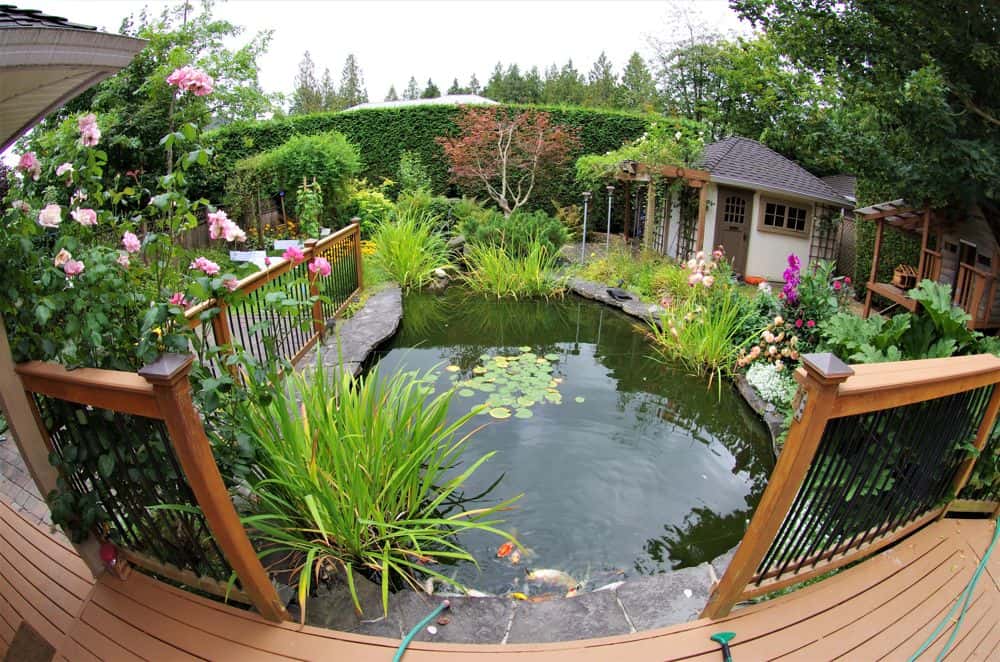Owning a pond is a genuine pleasure that can have far-reaching benefits for your mental health and wellbeing. They are also nice to look at, which is a bonus.
Ponds do take some maintenance and care though. Which is what today’s post is all about.
Done right, ponds can be kept relatively low maintenance and not require endless hours of cleaning. But only if you keep up with everything.

Pond maintenance tips
Like everything in life, prevention is better than cure.
Follow these simple pond maintenance and care tips and you should be able to enjoy a happy, healthy pond for years to come!
Remove debris regularly
Removing dead plants and leaves from your pond not only keeps it looking good, it also minimises nitrates and other compounds emitted during decomposition.
As nitrate levels have a huge influence over the health and balance of your pond, this part is essential.
How often you clean up depends on how much debris your pond accumulates, but get into the habit of clearing out on a regular basis.
Monitor your pond pump and filter
Pond pumps and filters require minimal maintenance, but a quick check every few weeks would be well worth your time.
Check the pump to make sure it’s operating and ensure the inlet for it is clear of debris.
Check the UV light if you have a clarifier and change it when required.
Monitor your fish feeding
Fish feeding is something you’ll get used to overtime but requires a little planning and a lot of observation.
Give fish too little food and they will lack energy and become unhealthy.
Feed them too much and you’ll have uneaten food in the water, which will break down and decompose.
Decomposition will increase nitrate levels in the water and provide food for pond snails and algae, which is not the best outcome.
Monitor water levels
Monitoring water levels takes just a second but could be critically important.
Levels will fluctuate slightly throughout the year as water will evaporate and be replenished in rain.
However, larger drops in the water level could indicate a leak. You’ll need to address that as quickly as possible to maintain the health of your pond.
Control pond plants
Pond plants are an essential ingredient in a healthy pond and should be encouraged at all times.
However, some plants have a tendency to spread uncontrollably, which can cause problems for other plants.
Deadhead flowers as required, remove dead leaves so they don’t fall into the water, monitor spread and health of all your plants and generally try to keep everything working happily.
Cleaning a pond
There is no hard and fast rule on how often to empty and clean your pond. Much will depend on how dirty it gets. Plan for doing it in spring though.
Use an old bath or paddling pool and leave it out to collect rainwater. Transfer the fish into it while you work.
This will work better than tap water as it won’t need the chlorine neutralised.
Drain the pond into another large receptacle if you have one.
Clean the pond out, remove all debris, all pond snails and clean all rocks and water features.
Remove silt but keep it for your flower beds or vegetable patch as it’s a great fertiliser.
Repair any damage to the liner or any holes you detect.
Replace the plants, some of the silt and water features.
Refill the pond with the saved water, add the fish and use some of the water from the bath or paddling pool to top up the pond.
Adjust the water levels depending on how it tests. Try to use saved rainwater rather than tap water. It won’t go back to normal right away, but the closer you get it to its old levels, the faster it will adapt.
Make sure your pond pump and filter are working and the inlet and outlet are clear and allow the pond to rebalance itself.
Rebalancing may take days or weeks depending on the size of the pond and how much the water changed.
Monitor regularly to ensure the fish remain healthy and active.
There may be other pond maintenance steps you need to take if you have specific types of fish or pond life, but these are the basics.
Take care of these and your pond will likely take care of the rest!